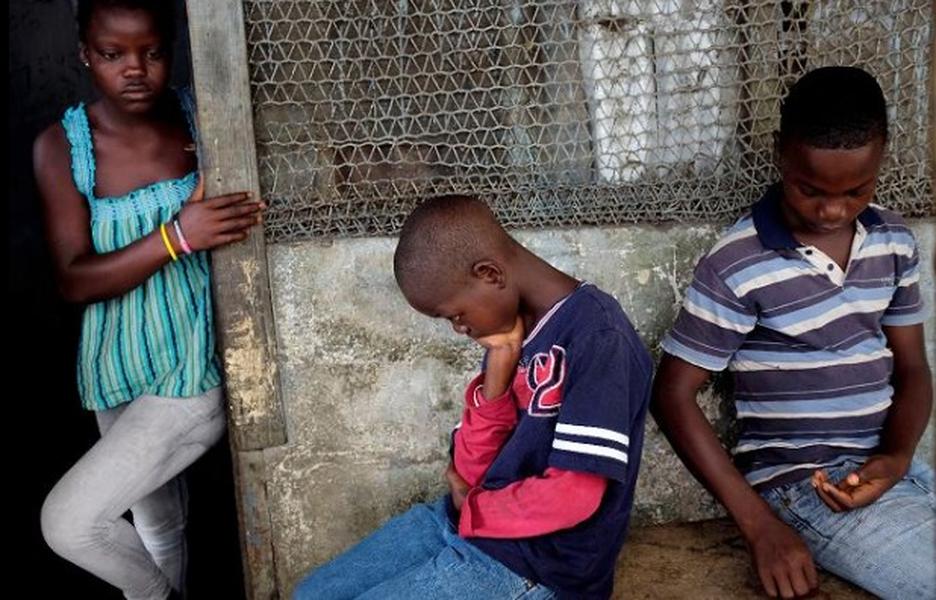Children orphaned by Ebola find themselves shunned by family, friends


A free daily email with the biggest news stories of the day – and the best features from TheWeek.com
You are now subscribed
Your newsletter sign-up was successful
In Liberia, Sierra Leone, and Guinea, more than 3,700 children have lost one or both of their parents to Ebola, and the U.N. children's agency believes that by mid-October that number will likely double.
The children are often ostracized by their extended families and neighbors, who are terrified of getting Ebola. They live alone in the homes where their parents died, and oftentimes teenage orphans end up caring for their younger siblings. In Monrovia, Liberia, that's what Promise Cooper is now doing, following the death of her mother, father, and infant brother from the virus.
Promise told The Associated Press that as word spread through the area that her parents had Ebola, visits from family and friends stopped. She tried to sell water to earn money for her family, but no one would buy any. Vendors wouldn't serve her in the local markets, and neighborhood children refused to play with her younger brothers and sister. Promise became depressed, and the children, still dealing with their grief, would cry for their mother at night.
The Week
Escape your echo chamber. Get the facts behind the news, plus analysis from multiple perspectives.

Sign up for The Week's Free Newsletters
From our morning news briefing to a weekly Good News Newsletter, get the best of The Week delivered directly to your inbox.
From our morning news briefing to a weekly Good News Newsletter, get the best of The Week delivered directly to your inbox.
The Cooper family finally found an ally in town: Kanyean Molton Farley, a human rights researcher who went around the St. Paul Bridge community to document how many children have become orphans due to Ebola (he's counted 28). Farley worried about the Coopers — they had no money, and he was afraid older men might try to prey on 16-year-old Promise — and began to make daily visits. Recently, one relative has come forward to check in on the children. Helen Kangbo was away from Monrovia when her brother and sister-in-law died, and because she has started to visit her nieces and nephews, other members of the family won't go near her. "I have to come back because everyone has abandoned them," she told AP. "I must have the courage to come."
A free daily email with the biggest news stories of the day – and the best features from TheWeek.com
Catherine Garcia has worked as a senior writer at The Week since 2014. Her writing and reporting have appeared in Entertainment Weekly, The New York Times, Wirecutter, NBC News and "The Book of Jezebel," among others. She's a graduate of the University of Redlands and the Columbia University Graduate School of Journalism.
-
 The problem with diagnosing profound autism
The problem with diagnosing profound autismThe Explainer Experts are reconsidering the idea of autism as a spectrum, which could impact diagnoses and policy making for the condition
-
 What to know before filing your own taxes for the first time
What to know before filing your own taxes for the first timethe explainer Tackle this financial milestone with confidence
-
 The biggest box office flops of the 21st century
The biggest box office flops of the 21st centuryin depth Unnecessary remakes and turgid, expensive CGI-fests highlight this list of these most notorious box-office losers
-
 Nobody seems surprised Wagner's Prigozhin died under suspicious circumstances
Nobody seems surprised Wagner's Prigozhin died under suspicious circumstancesSpeed Read
-
 Western mountain climbers allegedly left Pakistani porter to die on K2
Western mountain climbers allegedly left Pakistani porter to die on K2Speed Read
-
 'Circular saw blades' divide controversial Rio Grande buoys installed by Texas governor
'Circular saw blades' divide controversial Rio Grande buoys installed by Texas governorSpeed Read
-
 Los Angeles city workers stage 1-day walkout over labor conditions
Los Angeles city workers stage 1-day walkout over labor conditionsSpeed Read
-
 Mega Millions jackpot climbs to an estimated $1.55 billion
Mega Millions jackpot climbs to an estimated $1.55 billionSpeed Read
-
 Bangladesh dealing with worst dengue fever outbreak on record
Bangladesh dealing with worst dengue fever outbreak on recordSpeed Read
-
 Glacial outburst flooding in Juneau destroys homes
Glacial outburst flooding in Juneau destroys homesSpeed Read
-
 Scotland seeking 'monster hunters' to search for fabled Loch Ness creature
Scotland seeking 'monster hunters' to search for fabled Loch Ness creatureSpeed Read
